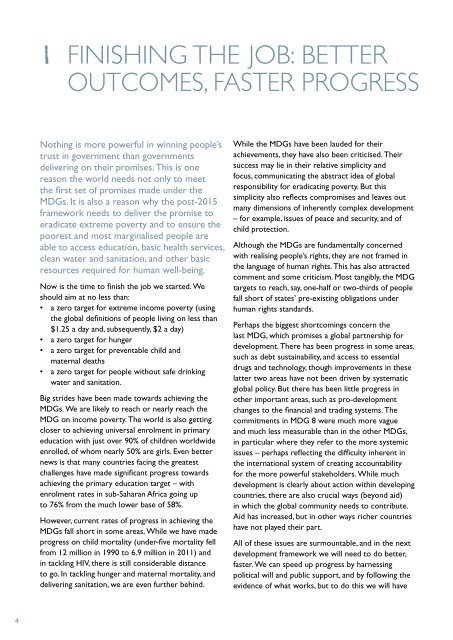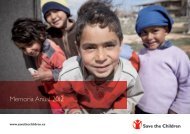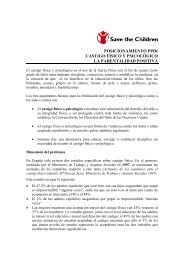ENDING poverty - Save the Children
ENDING poverty - Save the Children
ENDING poverty - Save the Children
Create successful ePaper yourself
Turn your PDF publications into a flip-book with our unique Google optimized e-Paper software.
1 FINISHING THE JOB: BETTER<br />
OUTCOMES, FASTER PROGRESS<br />
Nothing is more powerful in winning people’s<br />
trust in government than governments<br />
delivering on <strong>the</strong>ir promises. This is one<br />
reason <strong>the</strong> world needs not only to meet<br />
<strong>the</strong> first set of promises made under <strong>the</strong><br />
MDGs. It is also a reason why <strong>the</strong> post-2015<br />
framework needs to deliver <strong>the</strong> promise to<br />
eradicate extreme <strong>poverty</strong> and to ensure <strong>the</strong><br />
poorest and most marginalised people are<br />
able to access education, basic health services,<br />
clean water and sanitation, and o<strong>the</strong>r basic<br />
resources required for human well-being.<br />
Now is <strong>the</strong> time to finish <strong>the</strong> job we started. We<br />
should aim at no less than:<br />
<br />
<strong>the</strong> global definitions of people living on less than<br />
$1.25 a day and, subsequently, $2 a day)<br />
<br />
<br />
maternal deaths<br />
<br />
water and sanitation.<br />
Big strides have been made towards achieving <strong>the</strong><br />
MDGs. We are likely to reach or nearly reach <strong>the</strong><br />
MDG on income <strong>poverty</strong>. The world is also getting<br />
closer to achieving universal enrolment in primary<br />
education with just over 90% of children worldwide<br />
enrolled, of whom nearly 50% are girls. Even better<br />
news is that many countries facing <strong>the</strong> greatest<br />
challenges have made significant progress towards<br />
achieving <strong>the</strong> primary education target – with<br />
enrolment rates in sub-Saharan Africa going up<br />
to 76% from <strong>the</strong> much lower base of 58%.<br />
However, current rates of progress in achieving <strong>the</strong><br />
MDGs fall short in some areas. While we have made<br />
progress on child mortality (under-five mortality fell<br />
from 12 million in 1990 to 6.9 million in 2011) and<br />
in tackling HIV, <strong>the</strong>re is still considerable distance<br />
to go. In tackling hunger and maternal mortality, and<br />
delivering sanitation, we are even fur<strong>the</strong>r behind.<br />
While <strong>the</strong> MDGs have been lauded for <strong>the</strong>ir<br />
achievements, <strong>the</strong>y have also been criticised. Their<br />
success may lie in <strong>the</strong>ir relative simplicity and<br />
focus, communicating <strong>the</strong> abstract idea of global<br />
responsibility for eradicating <strong>poverty</strong>. But this<br />
simplicity also reflects compromises and leaves out<br />
many dimensions of inherently complex development<br />
– for example, issues of peace and security, and of<br />
child protection.<br />
Although <strong>the</strong> MDGs are fundamentally concerned<br />
with realising people’s rights, <strong>the</strong>y are not framed in<br />
<strong>the</strong> language of human rights. This has also attracted<br />
comment and some criticism. Most tangibly, <strong>the</strong> MDG<br />
targets to reach, say, one-half or two-thirds of people<br />
fall short of states’ pre-existing obligations under<br />
human rights standards.<br />
Perhaps <strong>the</strong> biggest shortcomings concern <strong>the</strong><br />
last MDG, which promises a global partnership for<br />
development. There has been progress in some areas,<br />
such as debt sustainability, and access to essential<br />
drugs and technology, though improvements in <strong>the</strong>se<br />
latter two areas have not been driven by systematic<br />
global policy. But <strong>the</strong>re has been little progress in<br />
o<strong>the</strong>r important areas, such as pro-development<br />
changes to <strong>the</strong> financial and trading systems. The<br />
commitments in MDG 8 were much more vague<br />
and much less measurable than in <strong>the</strong> o<strong>the</strong>r MDGs,<br />
in particular where <strong>the</strong>y refer to <strong>the</strong> more systemic<br />
issues – perhaps reflecting <strong>the</strong> difficulty inherent in<br />
<strong>the</strong> international system of creating accountability<br />
for <strong>the</strong> more powerful stakeholders. While much<br />
development is clearly about action within developing<br />
countries, <strong>the</strong>re are also crucial ways (beyond aid)<br />
in which <strong>the</strong> global community needs to contribute.<br />
Aid has increased, but in o<strong>the</strong>r ways richer countries<br />
have not played <strong>the</strong>ir part.<br />
All of <strong>the</strong>se issues are surmountable, and in <strong>the</strong> next<br />
development framework we will need to do better,<br />
faster. We can speed up progress by harnessing<br />
political will and public support, and by following <strong>the</strong><br />
evidence of what works, but to do this we will have<br />
4
















